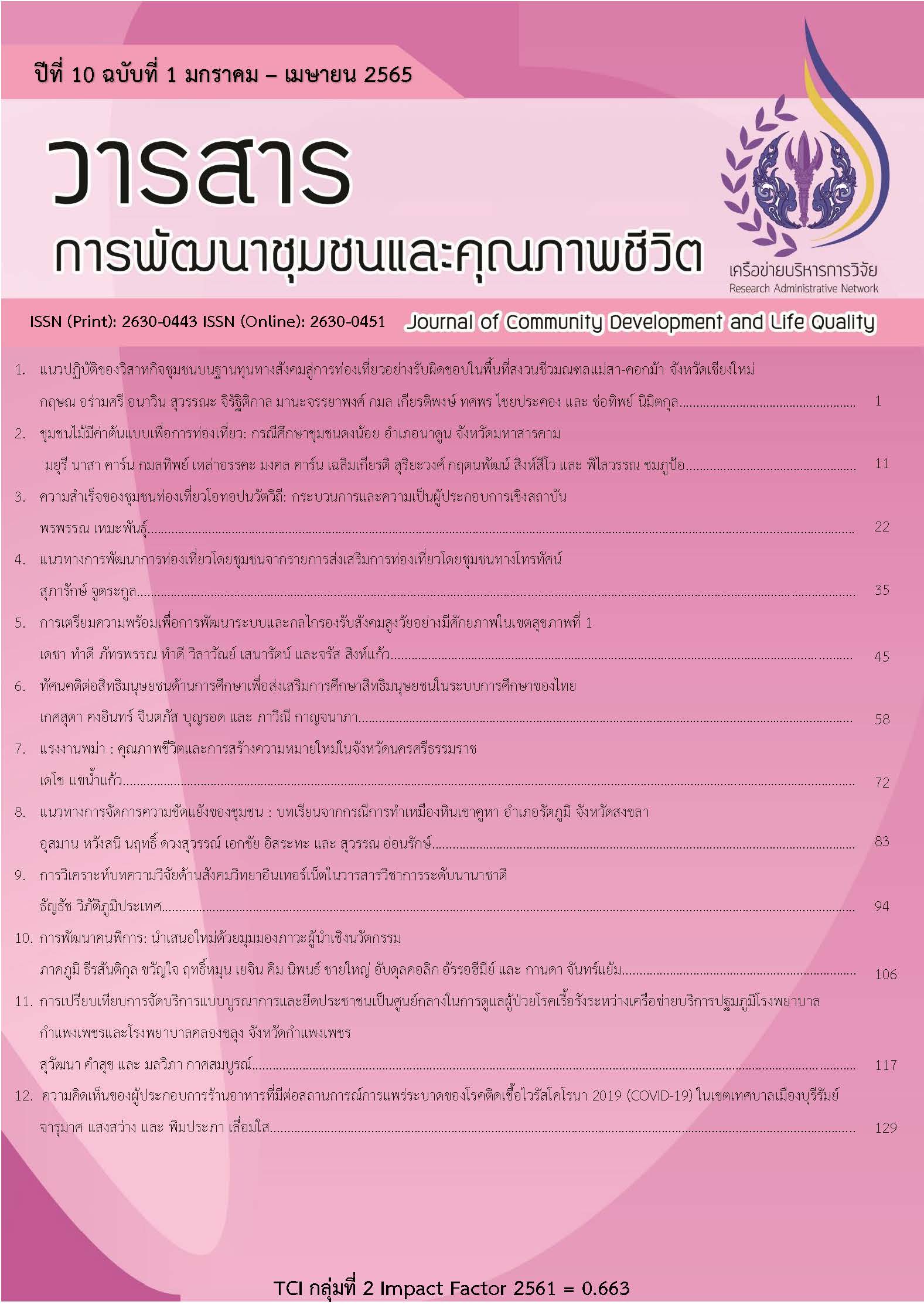แนวทางการจัดการความขัดแย้งของชุมชน : บทเรียนจากกรณีการทำเหมืองหิน เขาคูหา อำเภอรัตภูมิ จังหวัดสงขลา
Main Article Content
บทคัดย่อ
บทความนี้ มีวัตถุประสงค์เพื่อศึกษาความขัดแย้งของชุมชนจากการทำเหมืองหินเขาคูหาและเสนอแนะแนวทางการจัดการความขัดแย้งของชุมชนจากการทำเหมืองหินเขาคูหา โดยใช้วิธีการวิจัยเชิงคุณภาพแบบกรณีศึกษา ใช้วิธีการสัมภาษณ์ การสนทนากลุ่มและกระบวนการมีส่วนร่วมในการระดมความคิดเห็น ผลการศึกษาพบว่า ความขัดแย้งของชุมชนจากการทำเหมืองหินเขาคูหามี 4 ด้าน ได้แก่ 1) ความขัดแย้งจากปัญหาผลกระทบการระเบิดหิน 2) ความขัดแย้งจากผลประโยชน์ส่วนบุคคลและผลประโยชน์ทับซ้อน 3) ความขัดแย้งจากกรอบคิดการพัฒนาที่ให้คุณค่าที่ต่างกัน และ 4) ความขัดแย้งทางกฎหมาย กฎระเบียบ และกระบวนการทางสังคมที่ไม่เอื้อต่อการฟังและการรับฟัง โดยมีข้อเสนอแนะแนวทางการจัดการความขัดแย้งของชุมชนดังนี้ 1) กำหนดยุทธศาสตร์การพัฒนา วางแผนการพัฒนาและใช้ประโยชน์จากเหมืองหินเขาคูหา 2) พัฒนากลไกความร่วมมือโดยให้ภาคส่วนต่าง ๆ ในพื้นที่ได้มีส่วนร่วมในการกำหนดแผนพัฒนา 3) พัฒนาพื้นที่เขาคูหาให้เป็นแหล่งเรียนรู้และแหล่งท่องเที่ยวทางธรรมชาติของชุมชน
Article Details

อนุญาตภายใต้เงื่อนไข Creative Commons Attribution-NonCommercial-NoDerivatives 4.0 International License.
กองบรรณาธิการขอสงวนสิทธิ์ในการตรวจและแก้ไขบทความที่เสนอเพื่อตีพิมพ์ในวารสารการพัฒนาชุมชนและคุณภาพชีวิต
บทความหรือข้อความคิดเห็นใด ๆ ที่ปรากฏในวารสารการพัฒนาชุมชนและคุณภาพชีวิต เป็นวรรณกรรมของผู้เขียนโดยเฉพาะคณะผู้จัดทำไม่จำเป็นต้องเห็นด้วย และไม่ใช่ความรับผิดชอบของมหาวิทยาลัยและคณะผู้จัดทำ / บรรณาธิการ
เอกสารอ้างอิง
Banpasirichot, C. 2000. The development of the conflict: the path of democracy”. In the way society Thailand. Editorial Khosananan, Charan: Publishing Foundation, Bangkok. 159-196
(in Thai)
Carpenter, S. L. and W.J.D. Kennedy. 1981. Environmental conflict management: new ways to solve problems. Mountain Research and Development. 1(1): 65-70
Chompunth, C. 2017. Environmental conflict management: A case study of the thermal coal-fired power plant project in Rayong province. Kasetsart Journal of Social Sciences. 38(3): 692-703 (in Thai)
Department of Environmental Quality Promotion. 1992. Cabinet resolutions related to the determination of watershed quality class. Department of Environmental Quality Promotion, Bangkok. (in Thai)
Department of Primary Industries and Mines. 2012. Guidelines for resolving conflicts from mining Operations. DM Printing, Bangkok. (in Thai)
Dueramea, M. and S. Chingchit. (eds). 2013. Drilled the southern development plan. National Health Commission Office, Nonthaburi.
Fisher, J. 2014. Managing environmental conflict. Ch.55 In: P. T. Coleman, M. Deutsch and E. C. Macus (eds.). The Handbook of Conflict Resolution: Theory and Practice. 3rd ed., John Wiley & Sons, San Francisco.
Hart, N. and P. Castro. (eds.). 2000. Conflict and natural resource management. Food and Agriculture Organization of the United Nations, Rome.
Khunthongphet, N. and N. Doungsuwan. 2016. Community rights and the protection of Khao Khuha. Hatyai Academic Journal, 14(1): 63-77. (in Thai)
Makarapirom, P. 2007. Environmental conflict resolution. Research report. Social Research Institute, Chiang Mai University, Chiang Mai. (in Thai)
Rattana, K. 2010. Developing the potential of network partners in planning natural resources and environment management strategies at the local level. Department of Environmental Quality Promotion, Bangkok. (in Thai)
Tissamana, A. 2015. Guidelines for environmental conflicts resolution:
A case study of Suan Phueng, Ratchaburi. Journal of Environmental Management. 11(2): 60-75. (in Thai)
Walker, G.B. and S. E. Daniels. 2019. Collaboration in environmental conflict management and decision-making: Comparing best practices with Insights from collaborative learning work. Frontiers in Communication, 4:2, doi: 10.3389/fcomm.2019.00002.
Watthanasap, W. 2007. Conflict: Principles and Tools for Resolution. 3rd ed. Siripan Offset, Khon Kean. (in Thai)


